- Home
- Darrell Maloney
The Blockade
The Blockade Read online
Final Dawn
Book 18:
The Blockade
By Darrell Maloney
This is a work of fiction. All persons depicted in this book are fictional characters. Any resemblance to any real person, living or dead, is purely coincidental. Copyright 2020 by Darrell Maloney
This book is dedicated to:
Sydney Keeler
Tom Haltom
Ciera Eastin
John Suarez
Eileen Lawrence
Kathy Foster
Valerie Holder
Barbara Henderson Chandler
Sheila Simmons Rector
Sharon Roop
Without readers a writer is nothing but a guy throwing random words against a wall to see which ones stick together. Thank you all for reading my stuff and liking it enough to come back for more.
Previously…
Frank Woodard and Josie Dykes were married in their own minds, but not in the eyes of Texas and not in the eyes of God.
Texas has no minimum number of months a couple has to present themselves as a married couple before their union becomes legal. But there is a requirement to file what’s called a Declaration of Informal Marriage with the county clerk in the county they reside in.
They’d have been happy to complete such a document, but county clerk offices had been shuttered all over the state for many years.
Since that was something they had absolutely no control over, they didn’t worry about it much.
It was the religious pronouncement of marriage they worried about.
Both had been God-fearing people all their lives. And they didn’t like that technically they were living in sin. Their union hadn’t been presided over by a man of the cloth and blessed by God. Again, not their fault. Preachers were hard to find in the frozen world.
In the months immediately following the start of the freeze many churches remained open. Preachers figured people needed God more at that time than perhaps any other time in recorded history.
Then the federal government declared the almighty dollar null and void, and something odd happened.
Most preachers decided that ministering to their flocks with no way of being financially compensated wasn’t worth their time.
One by one the churches closed their doors.
One by one the men of the cloth left the church and found other pursuits.
Only the strong of faith continued to save souls for free, and it became ridiculously easy to tell which ones walked the walk and which ones only talked the talk.
Deprived of spiritual guidance many chose to give up and commit suicide instead of braving the icy world in search of another church with a real minister who’d take them in.
Frank and Josie didn’t have a clue where to find a preacher in Plainview, and strongly suspected such a man would choose not to marry them anyway. After all, they’d have to apply for a marriage license at that same county clerk’s office. And again, it was closed and shuttered for the duration.
After much inner turmoil they decided that God, being all powerful and all knowing and above all a benevolent being, would certainly understand their predicament.
Surely He would forgive them for holding off under the circumstances, as long as they promised to do the necessary paperwork as soon as the world became sane again.
Whether that would happen in their lifetimes was anybody’s guess.
But both of them were willing to stand before St. Peter someday and explain, and both were certain they’d be welcome to enter the pearly gates.
The couple made an almost clean break from the Food World Distribution Center in Plainview.
“Almost clean” but not completely so, for thirty miles south of the town they discovered a stowaway –Crazy Eddie – buried beneath the pile of MREs Frank had stashed in the cargo bay.
Eddie’s presence wasn’t a deal breaker, nor was it a major problem; both had been uncomfortable about leaving him behind.
Both welcomed him with almost-open arms.
South of Plainview, in the city of Lubbock, Frank reconnected with an old cop friend named Ronnie. Ronnie supplied him with a stash of weapons and a better snow plow blade, and our hapless trio was on the road again.
At the blinding speed of three miles an hour.
Still, they were on the move, going slightly faster than a herd of turtles and only three hundred miles or so from their final destination.
Their one bright spot was that they were headed south. And Texas was a very large state.
So large that average temperatures in north Texas are seventeen degrees cooler than average temperatures in south Texas.
Annual snowfall in Perryton, the northernmost city in Texas, is eighteen inches per year.
Annual snowfall in San Antonio, closer to the equator and much drier, is less than an inch.
“The farther south we go,” Frank maintained, “the lower the snow pack. At some point I’ve got to believe we’ll be able to pick up the pace considerably.”
“I sure hope so,” Josie said. “I certainly don’t want to spend a hundred days on the road.”
“I don’t either, Mister Frank,” added Eddie. “On account of that’s a real long time.”
He whispered in Josie’s ear, “Miss Josie, how many is a hunnerd?”
Frank and Josie weren’t the only ones plowing snow. By some strange happenstance their good friend Marty Haskins was doing exactly the same thing.
Al Petrie, the mayor of the tiny town of Eden, was having severe abdominal pains.
That in itself was bad enough, but the fact Eden had no medical staff made it infinitely worse.
Debbie’s diagnosis was acute appendicitis.
He needed lifesaving surgery, and the nearest trauma hospital was a hundred miles away in San Antonio.
To get Al there and to save his life would require a group effort.
Marty and his good friend Ace Boone drove a snow plow to clear the way.
Hannah, Brad and Debbie escorted Al in a Humvee right behind them.
The group made it to San Antonio, and was permitted onto Joint Base Lackland so Al could be treated at the military hospital there.
Al’s surgery went well. His appendix was removed and he was cooling his heels at Wilford Hall Medical Center on his way to making a full recovery.
Not so fast, though.
Things had never been easy for this group of survivors and friends. Sometimes it seemed that fate and happenstance conspired against them to make every moment of their lives miserable.
The base was in turmoil.
Two colonels had been arrested for treason and mutinous behavior.
They were innocent and being railroaded.
One was so distraught he committed suicide.
The city of San Antonio was rising up in support of the other one, Colonel Morris Medley.
Trouble was brewing.
Everyone knew it; military and civilians alike.
The base was braced for the worst, for they knew something big was in the works.
They just didn’t know what it was.
Hannah was determined to help, for she felt partly responsible for the colonel’s predicament.
“Somebody needs to tell the general he’s a jerk. And that he’s making a very big mistake; that he needs to back off and set the colonel free.”
General Lester Mannix was the Air Force Chief of Staff and the convening authority for Colonel Medley’s court martial.
He outranked every other person on the base. In fact, as Chairman of the Joint Chiefs of Staff, he outranked everyone in a military uniform.
No one could talk sense into him; very few would even dare try.
“I can,” Hannah said. “I’m a civilian. He can’t send me to an
isolated camp in the far reaches of the Antarctic. There’s nothing he can do to me.”
She was, perhaps, a bit overconfident.
But to save Colonel Medley from a guilty verdict and a possible firing squad she was willing to try.
And now the story continues
with Final Dawn, Book 18:
The Blockade
-1-
Johnny Connolly was a despicable human being, devoid of a conscience and lacking a moral compass. He was in and out of prison since his “prison” was juvenile hall.
His first stint in adult jail was at age nineteen, when he robbed a convenience store. He pulled a gun on the clerk, grabbed a fistful of money from her, and ran headlong out the door. Right into the arms of two uniformed policemen, who just happened to stop at the store for coffee.
That was another thing about Johnny.
Besides having no morals, he had the worst luck of anyone he knew.
Except one time.
Just before Saris 7 struck the earth his court-appointed attorney came to visit Johnny in jail.
He sometimes refused to talk to his attorneys. They usually brought bad news.
Besides, he was in the middle of something very important: shaking down a new inmate for protection.
The kid was barely eighteen and in jail for the first time on a hit and run charge. Seems he seriously injured a pregnant woman and her young daughter.
“Man, they’re gonna tear you up,” Johnny told him while nodding his head toward two gorilla-types watching from the other side of the common area.
“What should I do?”
“I’ll tell you what. You said your old lady put some money on your books?”
“Yes.”
“Okay. I’m gonna give you a shopping list. Not much, just a few bucks worth of stuff. That’ll buy you a week’s worth of protection. If they come near you I’ll head ‘em off and beat the crap out of ‘em. If you don’t bond out by Monday I’ll give you another shopping list for next week.”
“But they’re way bigger than you.”
“Maybe so. But I’m a crazy Irishman who fights dirty. They won’t stand a chance.”
Actually, Johnny planned to pay half his grocery haul to the goons not to touch the new guy. It was a scam as old as the jail itself.
Once done he was in a good mood and decided to talk to his attorney after all.
“They’re dropping the charges against you,” the lawyer told him.
Johnny smiled from ear to ear.
“Cool. But why, exactly?”
“The Lubbock County Sheriff dropped the ball. Something about the chain of evidence. They left the dope you were carrying on a desk for a couple of days before it went to the lab for testing. They had to admit that others could have had access to it. And that it could no longer be used as evidence against you.”
“Does that mean I can have it back?”
“That wouldn’t be advisable. If you demanded it back it would be the same as confessing it was yours to begin with.”
“Damn. So what’s gonna happen to it?”
“It’s my understanding they’ve already destroyed it.”
“What a waste of good dope.”
“Johnny, can I ask you something?”
“As long as it don’t cost me any money.”
“When are you going to clean yourself up and get your act together?”
“What do you mean?”
“I mean this is your twelfth charge. You’ve been in and out of this jail so many times you know all the guards by their first names. I’ve represented you on four cases myself. When are you going to become a law-abiding citizen and put this life behind you?”
“Oh, don’t worry about me, man. This is my last time in here. If what they’re saying on the news is true, if that meteorite hits the earth and everything freezes over, I’ll never see the inside of this jail again.
“You can count on that.”
Johnny walked out of the jail a couple of hours later a free man.
Three weeks before he was completely out of the crystal methamphetamines he peddled to his junkies.
And almost out of H too: heroin. The brown death.
He needed to re-up.
The term “re-up” used to belong exclusively to the military. For enlisted soldiers it was slang for “reenlistment.” As in, “Hey Private Moseley, are you gonna get out when your time is up, or are you gonna re-up?”
Lately the drug culture has used the term to mean something completely different.
For drug dealers, to “re-up” means to restock their supply of the dope they’re using to poison the streets of America and kill America’s youth.
It means a trip to meet their supplier.
And that’s exactly what Johnny did just a few days before he was busted.
-2-
When a dealer meets with his supplier to exchange drugs for cash, it’s typically done hands-off.
It’s safer that way.
Johnny was told to be at the drop no later than one thirty in the morning.
His supplier, who he knew only by the street name “Do Boy,” assured him the drop vehicle would be by shortly thereafter.
“If he don’t see the can, he keeps on driving.”
It was standard procedure, and one Johnny knew well.
If Johnny got caught by the cops with a wad of fifty and hundred dollar bills, he’d get hassled but not arrested. It’s not illegal to carry several thousand dollars of cash, you see, as long as you don’t have drugs as well.
If he had both they could send him to prison for a very long time.
If all he had was cash he’d walk.
And without proof it was dirty money, he’d get to keep the cash too.
If he passed off the cash and they caught him with the dope, he’d go down hard.
But as long as his fingerprints weren’t on the packages of dope itself he could plea bargain. He could say he merely found a backpack while walking down the street. He was gonna turn it in to the cops, he’d swear on his mama’s grave and a stack of Bibles.
And the D.A., with no fingerprint or DNA evidence to dispute Johnny’s wild claim, would settle for sending him away for five years.
He’d be out on parole in three and be back on the same streets.
It’s a sad fact in today’s criminal justice system, with overworked district attorneys, crowded jails and heavily-laden court dockets.
But a drug dealer caught with drugs today is much more likely to be out in a couple of years than to go away for life.
Johnny made it to the drop site at one twenty.
The drop site wasn’t much.
A dimly-lit vacant lot in a seedy part of town.
He parked at the end of the block and checked his mirrors to make sure there were no cops around.
There weren’t. Just the same cars he’d noted were there an hour before when he drove down the same street.
The local cops didn’t like driving down this street anyway, for they weren’t well-liked in this neighborhood.
They were far more likely to be shot at than be greeted with a friendly wave, so they seldom patrolled here, seldom came by unless they were summoned.
Once Johnny was certain he wasn’t under surveillance he stepped out of the car, his hand resting on the beer can in his coat pocket.
This wasn’t just any beer can.
It was the one he’d modified with a pocket knife to become a money carrier.
He’d stabbed the thin aluminum bottom of the can, cutting it in an “X” pattern. Then he’d pushed each of the four points downward to make a jagged hole where the bottom of the can once was, then shoved his wad of bills into the hole.
Anyone coming along and seeing the wad inside the can would have a heck of a time getting it, as the jagged aluminum points would shred any fingers going inside the can to fish the cash out.
But Johnny didn’t have to worry about that.
Nobody would come walking down this
street at this time of night.
It’s been said that everyone out and about in east Lubbock after midnight is either a criminal or the police trying to catch them.
But that’s not true. Not really.
The police tend to stay away as well.
At least it seems that way to east Lubbock residents, who’ve long complained that police are slow to respond to their part of town late at night.
True or not, drug dealers and burglars and other shady characters prefer to do their dirty business in that part of town because they’re far less likely to get caught there.
Johnny had the street all to himself when he strolled through the vacant lot, looking both ways to make sure no cars were coming when he dropped the beer can into the weeds about a foot away from the curb.
He went to the end of the street and leaned against a fire hydrant, next to a street light which either burned out or was shot out. There he smoked a Marlboro Black while he waited.
He didn’t have to wait long.
After a couple of minutes a set of headlights turned the corner three blocks up and shone in Johnny’s direction.
They got larger and larger, as headlights tend to do when they’re getting closer and closer.
The black Cadillac Escalade slowed when it neared the vacant lot and came to a complete stop when it pulled up even with the beer can.
A rear door opened, a man stepped out and picked up the beer can, and jumped back into his seat.
The luxury SUV pulled away from the curb and picked up speed, passing Johnny as he watched an imaginary bird in the sky and lit a second cigarette.
He looked away as the vehicle passed because the men inside were connected with the Mexican cartel.
And the cartel doesn’t like it when gringos lay eyes upon them. It makes them antsy and nervous.
It’s not a good thing to make trigger-happy members of the cartel antsy or nervous.
That’s when people die.
-3-
The Escalade’s taillights disappeared from view but Johnny held his ground.

 A Perilous Journey
A Perilous Journey The Yellowstone Event: Book 6: The Aftermath
The Yellowstone Event: Book 6: The Aftermath Eden Bound
Eden Bound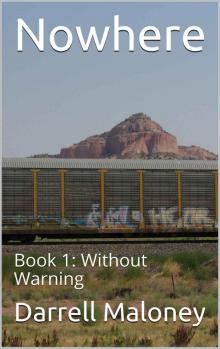 Without Warning
Without Warning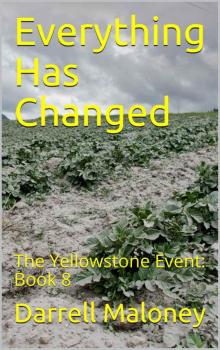 Everything Has Changed
Everything Has Changed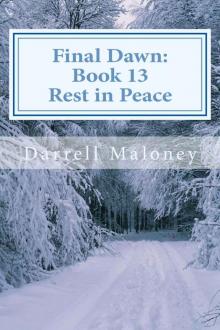 Rest in Peace
Rest in Peace This Changes Everything
This Changes Everything The Final Chapter
The Final Chapter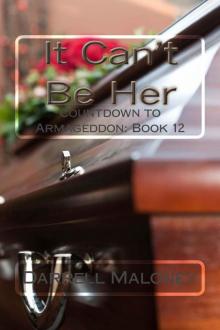 It Can't Be Her
It Can't Be Her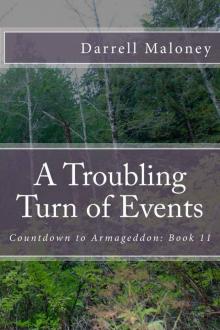 A Troubling Turn of Events
A Troubling Turn of Events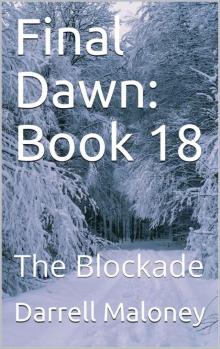 The Blockade
The Blockade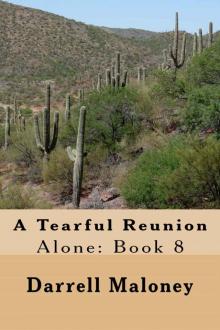 A Tearful Reunion
A Tearful Reunion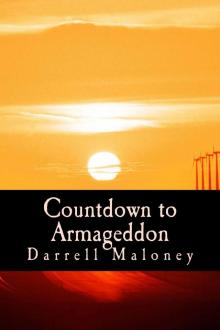 Countdown to Armageddon
Countdown to Armageddon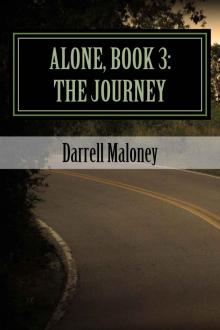 Alone, Book 3: The Journey
Alone, Book 3: The Journey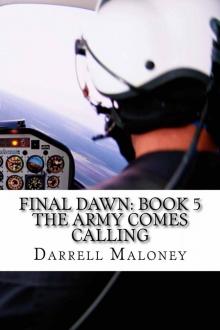 The Army Comes Calling
The Army Comes Calling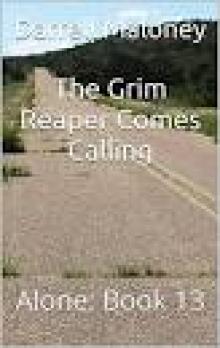 The Grim Reaper Comes Calling
The Grim Reaper Comes Calling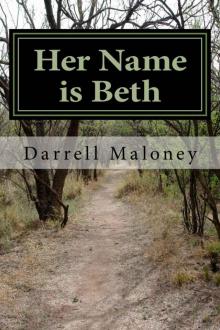 Her Name is Beth: Alone: Book 5
Her Name is Beth: Alone: Book 5 Red: The Adventure Begins
Red: The Adventure Begins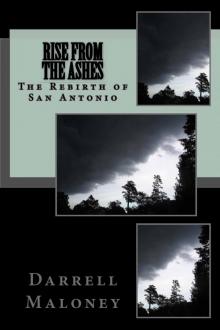 Rise From The Ashes: The Rebirth of San Antonio (Countdown to Armageddon Book 3)
Rise From The Ashes: The Rebirth of San Antonio (Countdown to Armageddon Book 3)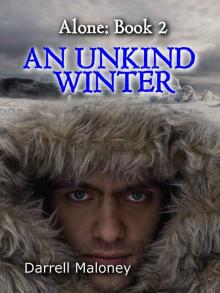 An Unkind Winter (Alone Book 2)
An Unkind Winter (Alone Book 2)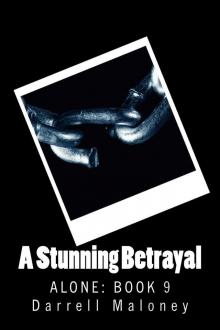 A Stunning Betrayal: Alone: Book 9
A Stunning Betrayal: Alone: Book 9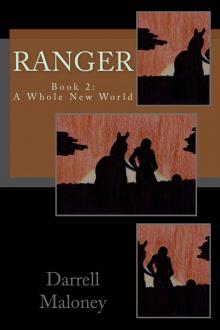 A Whole New World: Ranger: Book 2
A Whole New World: Ranger: Book 2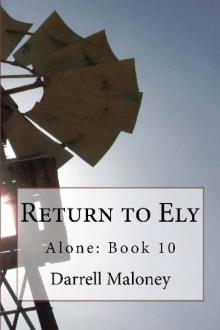 Return To Ely
Return To Ely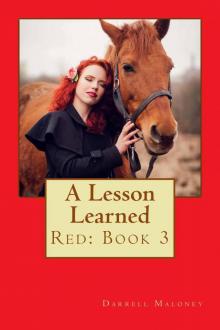 A Lesson Learned: Red: Book 3
A Lesson Learned: Red: Book 3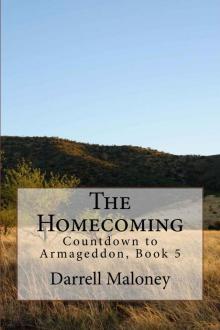 The Homecoming: Countdown to Armageddon: Book 5
The Homecoming: Countdown to Armageddon: Book 5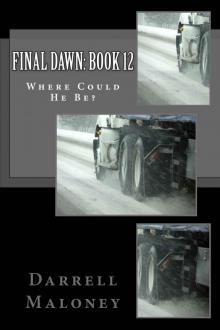 Final Dawn: Book 12: Where Could He Be?
Final Dawn: Book 12: Where Could He Be?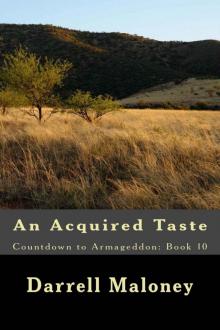 An Acquired Taste
An Acquired Taste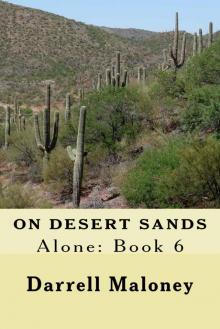 On Desert Sands: Alone: Book 6
On Desert Sands: Alone: Book 6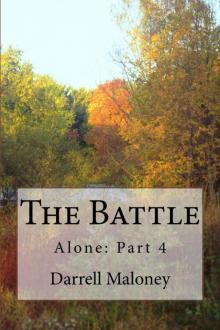 The Battle: Alone: Book 4
The Battle: Alone: Book 4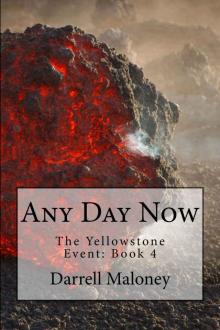 Any Day Now
Any Day Now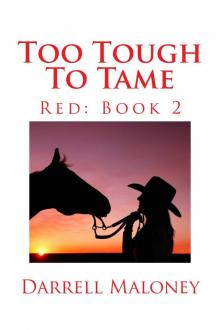 Too Tough To Tame: Red: Book 2
Too Tough To Tame: Red: Book 2 No Help From Austin: Red: Book 5
No Help From Austin: Red: Book 5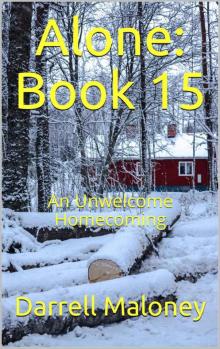 An Unwelcome Homecoming
An Unwelcome Homecoming A New Start: Final Dawn: Book 9 (Volume 9)
A New Start: Final Dawn: Book 9 (Volume 9)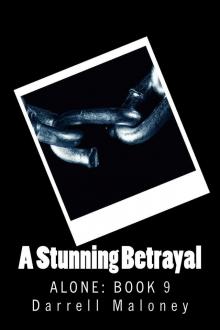 A Stunning Betrayal
A Stunning Betrayal An Undeclared War (Countdown to Armageddon Book 4)
An Undeclared War (Countdown to Armageddon Book 4)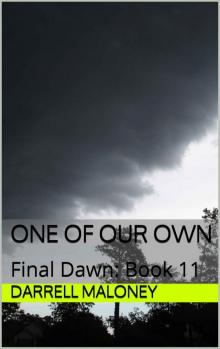 One of Our Own: Final Dawn: Book 11
One of Our Own: Final Dawn: Book 11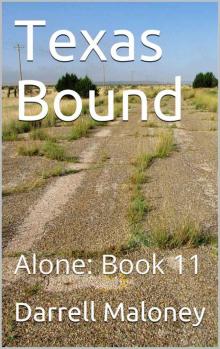 Texas Bound: Alone: Book 11
Texas Bound: Alone: Book 11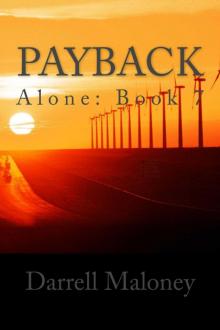 Payback: Alone: Book 7
Payback: Alone: Book 7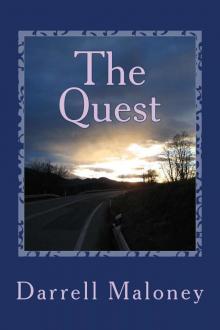 The Quest: Countdown to Armageddon: Book 6
The Quest: Countdown to Armageddon: Book 6 The Siege
The Siege The Yellowstone Event: Book 1: Fire in the Sky
The Yellowstone Event: Book 1: Fire in the Sky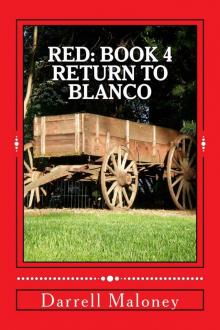 Return to Blanco (Red Book 4)
Return to Blanco (Red Book 4) The Search
The Search AFTER THE DUST SETTLED (Countdown to Armageddon Book 2)
AFTER THE DUST SETTLED (Countdown to Armageddon Book 2)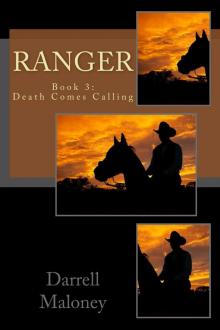 Death Comes Calling (Ranger Book 3)
Death Comes Calling (Ranger Book 3)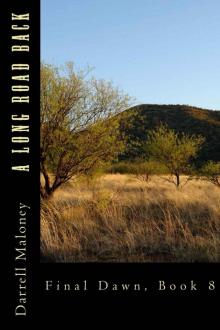 A Long Road Back: Final Dawn: Book 8
A Long Road Back: Final Dawn: Book 8